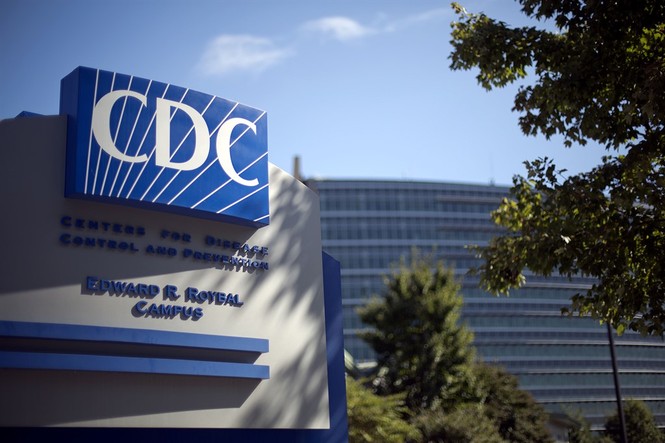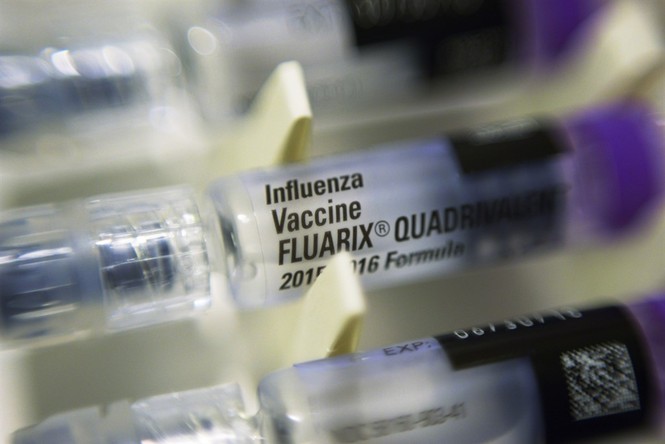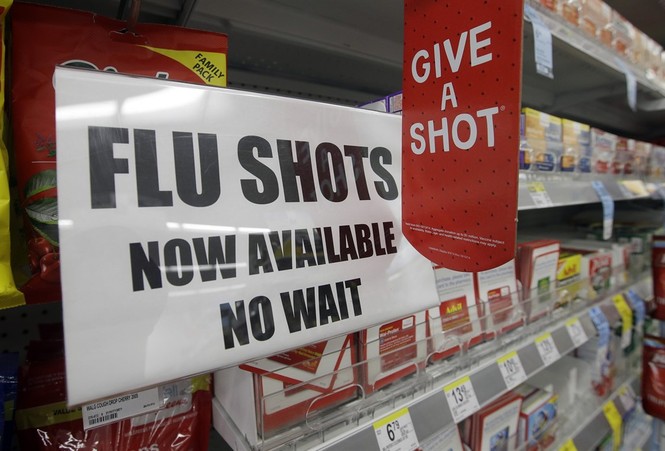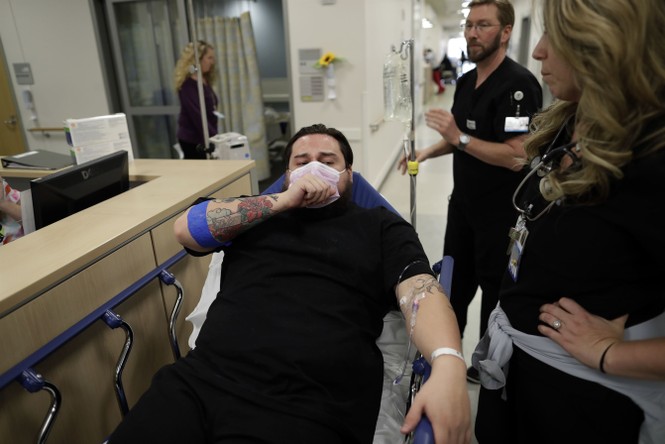UPDATE:
A spokesperson for the CDC recently told CNN that this year’s flu season hasn’t yet reached its peak, meaning we still have quite a few weeks to go before we’re in the clear.
According to the newest weekly report, which was released Friday, 37 children have now died from the flu this season. The number of laboratory-confirmed influenza-associated hospitalizations is now at 11,965. If we continue on this track, officials believe this could be one of the worst flu seasons we've had in 15 years.
Remember: if you haven’t been vaccinated already, do so as soon as possible; and if you’re feeling sick, talk to your doctor immediately.
***Original Post***
We’re officially in the heart of flu season, and the epidemic seems to be hitting the U.S. particularly hard this year.
Health officials are describing the current situation as “moderately severe,” with more than half of states reporting “high” flu activity. Not to mention, for the first time in the 13 years since the Center for Disease Control (CDC) began tracking the virus, the entire continental U.S. is experiencing widespread activity.
Naturally, with terms like “severe” and “widespread” being thrown out, some people are starting to panic, but just how concerned should we be?
The Numbers

According to the most recent weekly report from the CDC, 30 children have died from the virus as of January 13th. Since then, various news outlets have reported even more pediatric deaths due to the flu.
CHILD FLU DEATHS: 6-year-old Emily Grace Muth of Cary, North Carolina, died after she was diagnosed with the flu at an urgent care and sent home with Tamiflu; now, her parents are stressing the importance of flu shots, which Emily did not have. @DavidMuir reports. pic.twitter.com/guihs3rwHC
— World News Tonight (@ABCWorldNews) January 24, 2018
Recommended
This Dylan Winnik, just 12. His family says the flu came on fast, killing him Tuesday. He’s a 7th grader at Okeeheelee MS, in PBC.
— Andrew Lofholm (@AndrewLofholm) January 24, 2018
Here’s the letter his school sent home.
Here’s how you can help with funeral costs: https://t.co/9NTaNm2bnj@WPTV pic.twitter.com/pmCmQINdzf
While the CDC does not have any hard stats on adult, or overall, deaths from the influenza, a handful of states have been keeping track this season.
JUST IN: 21 deaths now linked to the flu in Connecticut, health officials say. https://t.co/cbwqYG8qN6
— WFSB Channel 3 (@WFSBnews) January 19, 2018
BREAKING: Maine CDC says number of flu deaths in the state has risen to 21. @NECN
— Danielle Waugh NBC 10 Boston (@DWaughNBCBoston) January 19, 2018
The deaths of 65 Kentuckians have been attributed to the flu this season. WKU is encouraging faculty, staff, and students to get their vaccine. https://t.co/yz6UlODTzt
— WKU Herald ?? (@wkuherald) January 24, 2018
"This one has started early, and it's a bad one." | Deaths from flu up to 72 in Arkansas; victims mostly people over 65: https://t.co/BdtZ1Oss94
— AR Democrat-Gazette (@ArkansasOnline) January 25, 2018
California, specifically San Diego, appears to be the hardest hit.
San Diego County has reported a record number of flu deaths. https://t.co/g0l0jW9qdm
— #NBC7 San Diego (@nbcsandiego) January 18, 2018
While these numbers may seem high, they’re not all that unusual when compared to previous years' reports - at least not yet.
The CDC estimates that anywhere from 12,000 to 56,000 people die each year due to the flu, and between 140,000 to 710,000 people will be hospitalized.
Since October 1st, close to 9,000 people have been hospitalized in the U.S. due to laboratory-confirmed influenza. That number has likely gone up in the past week and a half since the last report was pulled.
Why This Flu Season Seems Worse Than Previous Years

Of those cases in which people were hospitalized, 89.4 percent were associated with the influenza A virus. And of those, 86 percent were tied to H3N2, the most aggressive strain of the virus.
But that’s not the only issue.
Because there are various strains of influenza, creating a vaccine can be difficult. Health officials must predict months in advance which strains they think will be most prevalent that year. And when these officials predict incorrectly, the vaccine they created will be significantly less effective.
This year, the wrong strains were targeted; the vaccine is thought to be only about 30 percent effective (which is better than the rumored 10 percent).
Regardless, officials are still urging people to go out and get vaccinated if they have not yet done so. The CDC predicts that roughly 85 percent of children who will have died from the flu this year will not have been not vaccinated.
What to Do to Avoid the Flu and How to Stop It From Spreading

Besides getting vaccinated (your best bet), the CDC recommends taking the following measures (emphasis mine):
1. Avoid close contact.
Avoid close contact with people who are sick. When you are sick, keep your distance from others to protect them from getting sick too.
2. Stay home when you are sick.
If possible, stay home from work, school, and errands when you are sick. This will help prevent spreading your illness to others.
3. Cover your mouth and nose.
Cover your mouth and nose with a tissue when coughing or sneezing. It may prevent those around you from getting sick.
4. Clean your hands.
Washing your hands often will help protect you from germs. If soap and water are not available, use an alcohol-based hand rub.
5. Avoid touching your eyes, nose or mouth.
Germs are often spread when a person touches something that is contaminated with germs and then touches his or her eyes, nose, or mouth.
6. Practice other good health habits.
Clean and disinfect frequently touched surfaces at home, work or school, especially when someone is ill. Get plenty of sleep, be physically active, manage your stress, drink plenty of fluids, and eat nutritious food.
How to Know If You Have the Flu and What to Do If You’re Showing Symptoms

First off, you should always contact and take the advice of your doctor if you have any concerns, but according to the CDC, common symptoms are:
- Fever or feeling feverish/chills
- Cough
- Sore throat
- Runny or stuffy nose
- Muscle or body aches
- Headaches
- Fatigue (tiredness)
- Vomiting and diarrhea (common in children than adults)
It’s important to note that many of these symptoms are also associated with with the common cold. However, unlike with a cold, your symptoms will appear suddenly with the flu.
If you think you have the flu, it’s best to avoid contact with others and see a doctor if you don’t start improving after a few days.
Children, people over 65, and those with chronic health conditions are more likely to have serious complications with the flu. The CDC lists emergency warning signs on its website.
What to Take Away From All This

While the flu is a bit more brutal this year, it’s not the worst epidemic we’ve experienced.
The best course of action? Get vaccinated, wash your hands (a lot), and please stay home if you're experiencing symptoms. Those around you will thank you.

























Join the conversation as a VIP Member